Friday Feb 20, 2026
Friday Feb 20, 2026
Monday, 14 October 2024 01:34 - - {{hitsCtrl.values.hits}}

World Bank Senior Country Economist for Sri Lanka and Maldives Richard Walker
By Charumini de Silva
The World Bank last week confirmed that there is no new financial support pending for Sri Lanka, but discussions with the new Government have commenced to outline future plans for collaboration.
World Bank Senior Country Economist for Sri Lanka and Maldives Richard Walker affirmed that no new budgetary or program-related assistance is currently in the pipeline.
“There is no budget support or other pending programs at the moment. Of course, we need to have a conversation with the new Government, understand their plans and thinking. Then, on our side, we can also formulate the type of support that we can offer – whether it is budgetary assistance or other forms of operations. This is a discussion that needs to take place and it is just beginning now,” he said in response to a query posed by journalists at the Sri Lanka Development Update report launch last Thursday.
The beginning of discussions between the multilateral donor agency and the Government signals a potential fresh start, as Sri Lanka seeks to stabilise its economy amid ongoing recovery efforts.
The new Government led by President Anura Kumara Dissanayake, is expected to focus on securing international support and building stronger ties with multilateral institutions like World Bank to drive economic recovery post-crisis.
He noted that a recently signed $ 200 million loan agreement has been completed and further steps will depend on the outcome of the ongoing no talks between the World Bank and the Government.
On 8 October, the World Bank and the Government of Sri Lanka signed the Second Resilience, Stability, and Economic Turnaround (RESET) Development Policy Operation (DPO) for $ 200 million.
This is the second operation in a two-part series that began in 2022. The first operation, totalling $500 million, was disbursed in June and December 2023.
The Second RESET DPO aims to support reforms that improve economic governance, enhance growth and competitiveness, and protect the poor and vulnerable, helping to build Sri Lanka’s resilience and fostering an equitable economy.
When asked about the impact of elections on the economic outlook, Walker acknowledged that credit growth has been slow, whilst expressing confidence that it will gain momentum post-elections, provided there is policy consistency.
“While there may be some uncertainty during election times, business sentiment seems optimistic. Credit growth has been slow but is expected to pick up after the election with policy consistency moving forward,” he added.
The World Bank in its latest projections announced that the country’s economy has shown signs of stabilisation, whilst doubling its earlier estimate to reach 4.4% in 2024.
This positive outlook follows four consecutive quarters of growth, primarily driven by the industrial and tourism sectors. Despite expected gradual improvements, poverty levels are predicted to remain above 20% till 2026, while inflation is anticipated to stay below Central Bank’s target of 5% in 2024, before gradually increasing as demand picks up. Tourism and remittances are expected to keep the Current Account surplus through 2024.
It projects Sri Lanka’s economy to grow at a more modest pace of 3.5% in 2025, as a result of the adverse impacts of the economic crisis.